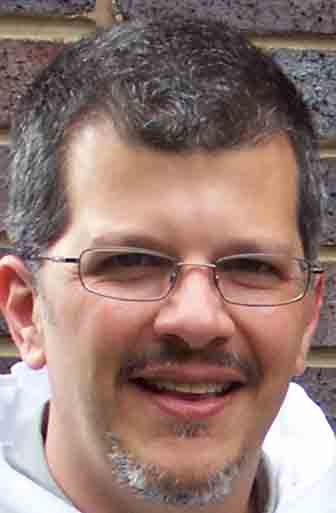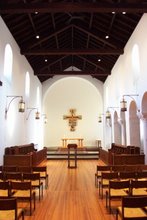 I am a self-confessed heavy packer; going on a trip is an opportunity to channel my inner Boy Scout and be prepared for all contingencies. If in any scenario I could possibly use something, odds are I’ll toss it in the suitcase. During years of youth retreats, camping trips, mission trips, and pilgrimages, I honed the fine art of packing. Preparing to go to Africa last January threw me into an existential crisis: two bags for five months! What should I take? What would I need? What was important? What had to be left?
I am a self-confessed heavy packer; going on a trip is an opportunity to channel my inner Boy Scout and be prepared for all contingencies. If in any scenario I could possibly use something, odds are I’ll toss it in the suitcase. During years of youth retreats, camping trips, mission trips, and pilgrimages, I honed the fine art of packing. Preparing to go to Africa last January threw me into an existential crisis: two bags for five months! What should I take? What would I need? What was important? What had to be left?What is this compulsion about? At one level, if for some reason I need 8 batteries or 50 Kleenex tissues or 5 pens, I’m ready. At a deeper level, it is about the desire to be safe and self-sufficient, in control and attached to a part of my material world to assure me in the illusion that I can be protected from the inevitable and unavoidable hazards and crises of life. It is stuff as the weapon in the battle against discomfort and dependence. For the Lord to say to his idealistic and eager missionaries “carry no purse, no bag, no sandals…” strikes me as highly impractical. Just what do you think you’re going to do if you get hungry or thirsty or if the sandals you’re wearing get a hole in them or the camera’s batteries start to die? Jesus would make a lousy Boy Scout!
This Gospel is about packing, however; packing for the journey of life in community, in the kingdom, as sent out ones. These seventy are getting ready for a mission into the unknown and unknowable - into acceptance and rejection, hope and danger, community and enmity, fields ripe and not so ripe. Opposition, struggle, and hardship live alongside healing, joy, peace, and the overpowering of evil with good. Our Lord calls his charges laborers and sheep; an invitation to become the lowest of the low in the social structure. Whether they felt adequate or not, prepared or not, confident or not, they put themselves out there in the raw and sometimes blind trust of faith, remembering they were not alone. How did they pack for a journey like that? They didn’t. They were to leave the stuff at home; the purse, the bag, the sandals - all of it.
In the first century part of how you communicated who you were, part of how you revealed and reinforced your place in the strict hierarchy of the culture was by what you wore and what you carried; purses, bags, and sandals were signs and symbols of status, position, and power. They are singled out here because to leave them was more than not having supplies, it was to refuse to participate in a game of labeling who’s important and who’s insignificant and to divest oneself of the message the stuff conveyed. Jesus does not ask them to travel in the safety and self-sufficiency of their material resources. He asks them to take each step in the promise and assurance of the kingdom and its new life. Luggage couldn’t be less important. In fact, not packing is the preparation. They were not to command attention and respect, not to show off their status or power - mainly because they didn’t have any by the culture’s standards. These missionaries had to learn that no position, no tool, no skill of their own by itself was bringing the kingdom. It was only God working through them and providing their needs, and only as they became open to it, that God’s rule would become real.
This is a different kind of evangelism. Instead of a system, a list, a method, a technique, a program, these seventy are to offer their vulnerable and dependent selves to whoever will receive them. Jesus in effect says to them: your empty hands are your witness. Your growling stomach and parched lips and dusty feet and sleepless eyes are your message. Their need, humility, healing, community and willingness to accept the care given to them by the other as they care in return is the proclamation. This is real evangelism - presence, hospitality, peace, and an openness to listen and respond to the new and unexpected.
What about us? How would this commission speak to us here this morning? In preparing for our journey, our work is to make hard decisions about what we have, what we take, what we leave behind, and what we bring back home. We are called to let go and become empty, open, and defenseless. In responding we must face the inner, hidden baggage that each of us carries in our hearts. God works through our innate poverty, continuously filling the emptiness we give as the offering of ourselves. Poverty of spirit breaks through our masks of pretense and gets to transparency and reality. Brennan Manning has said “I am convinced that without a gut-level experience of our profound spiritual emptiness, it is not possible to encounter the living God.” We’ve understood formation backwards. We’ve made it about what we do rather than about what God does in and through us. It is what feels the least spiritual - our longing, our hunger, our darkness, our inadequacy, our desperation that God wants and uses. Whatever inhibits or blocks us from connecting with each other, whatever that bag or purse is in our lives, has to be left behind in order to experience our emptiness and in that emptiness to offer ourselves to each other. We’re conditioned to believe that we are what we do and we are what we have. And that if we want to be someone else we simply do different things and buy different stuff. So to leave our bags - the masks we hide behind and the fantasies we live in to protect us is the radical and difficult journey of a lifetime.
Once we’ve begun to be prepared, we can see the harvest. It’s hard to gather crops if our bags are already full. If we are grasping our security and loaded down with bags of our own egos and agendas, we will not have room for gathering the new growth into the kingdom. And gather is what we are commissioned to do. Gathering is often the last thing we want to do. We have meetings about the harvest, committees designed to study and examine the harvest, retreats about how to harvest, we’ve written books and preached sermons about the importance of laboring in the fields, we can argue about whose method of gathering is better and how we can improve efficiency and effectiveness, but are we willing to get dirty in the fields doing the work of gathering connection, trust, peace, and compassion? Do we not at least sometimes believe that we’re excused, that getting in the dirt is somehow beneath us, that we could be more effective as harvest analyzers rather than laborers in the hot sun? What is in your bag? The invitation is to march empty-handed into the fields of a needy and ready world - offering no agenda but to be present and serve, no prejudice but that God’s peace is offered to all, no security but what is granted in the power of promise.
It is fortuitous that this Gospel comes as associates of the monastery have gathered this weekend to explore ways they can shape and renew their commitments to us and us to them. This Gospel reminds us of the urgency of the harvest and the importance of our willingness to look at new possibilities beyond what has been, beyond the routine, beyond the status quo. We must not keep quiet. We cannot stand still. We must not keep clinging to what does not give us real life. The world is ready, even desperate for our good news - that there is an alternative to being merely what we do and what we own, that it is possible in our media-saturated individualistic culture to hold up the power of community, of silence, of listening to God and each other, of being still long enough to hear the voice of welcome and healing and joy. We must challenge ourselves and then the church to live out our covenant with each other. We can reap a harvest beyond our imagining if we pray, drop our bags, roll up our sleeves, and get to work. The road ahead is clearly seen as we gather at the Lord’s Table and by receiving his Body and Blood publicly say that we throw in our lot with freedom, with being for others, with a hope and a future. It’s time to pack. What do you have, what will you take, what will you leave behind, what will you bring back home?




No comments:
Post a Comment